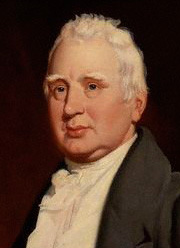| Profile | Major Works | Resources |
William Cobbett, 1763-1835
English free-lance journalist, pamphleteer, historian and political reformer.
The son of a small farmer and innkeeper in Farnham, Surrey. Of humble background, William Cobbett had few prospects in his youth. By chance, Cobbett found work as a copy clerk in London in early 1783, but abandoned it a few months later to enlist in the British army. Cobbett availed himself during lulls in his garrison at Clapham to educate himself and began to delve deeply into English literature. Rising in the ranks to NCO, Cobbett was stationed for eight years in Nova Scotia, Canada. Cobbett's regiment returned to England in 1791, and the very next year, after earning his discharge, Cobbett published the Soldier's Friend (1792) a damning indictment of army's inner workings, the corruption of officers and mistreatment of enlisted soldiers. To avoid trouble, Cobbett moved to France in 1792, and witnessed the violent shift in the fledgling revolution. The onset of war and the September massacres prompted his departure for the United States later that same year.
For the next few years, Cobbett made a slim living as a tutor and translator in Philadelphia. An anonymous 1794 pamphlet on the emigration of Joseph Priestley brought him some degree of celebrity. Cobbett set up a bookstore and monthly, The Censor in Philadelphia in 1796, but it folded after a few numbers. In March 1797, Cobbett set up a daily, the Porcupine Gazette, where he authored (under the pseudonym "Peter Porcupine") and reprinted virulent articles defending the British war against the French Republic. He also saw fit to comment on the American politics, aligning himself with the federalists. His outspoken politics and scurrilous articles quickly earned him some local enemies. After losing a couple of lawsuits for libel in Pennsylvania courts, Cobbett moved to the more solidly federalist New York and launched a new monthly, The Rush-light.
William Cobbett returned to England in 1800, and was given a warm welcome by Tories who had been following his tracts from overseas. With financial support from Tory luminaries, Cobbett published a collected edition of his American writings and launched a daily, The Porcupine, but it folded after a year. He also opened a bookstore in London, which also did not last very long. In January 1802,Cobbett launched the Political Register, a long-lasting weekly newsletter that he edited almost continuously from 1802 to 1835.
In 1803, William Cobbet began publishing his most enduring work, his monumental Parliamentary History of England, compiling detailed accounts of the proceedings of the English parliament from its beginnings in 1066 onwards. Cobbett's work has become the authoritative record of parliamentary history (taken over by T.C. Hansard after 1811, and continued until the modern day). His similarly impressive history of State Trials began being published in 1809.
Although Tory by inclination, Cobbett nonetheless soon soured and denounced many of the policies pursued by the Tory governments that ruled Britain through much of this period. Cobbett soon became more identified with the Radicals. He ran for parliament (but lost) in 1806 on a radical parliamentary reform ticket.
In economics, William Cobbett's principal claim to fame is his participation in the 1807-08 debate on underconsumption. In late 1807, he reviewed the recent treatise of William Spence and endorsed its conclusions in a series of articles entitled "Perish Commerce!" published in his Political Register. Among other schemes he promoted were the repudiation of the national debt and the abolition of most taxation.
In 1810, Cobbett was arrested and convicted for libel, and spent two years in Newgate Prison. It is during this period that he wrote his pamphlets against money, calling for the resumption of gold currency and the dissolution of the Bank of England. After his release, although financially ruined, Cobbett continued publishing, using the Political Register to rally opposition to the 1815 Corn Laws and denouncing the slavery abolition movement.
In 1817, fearing renewed arrest for libel, Cobbett fled to the United States (Yorkshire printer Thomas Wooler took charge of publishing Cobbett's Political Register in his absence). Cobbett tried setting himself up as a farmer in Long Island, New York, and published a few works on agriculture, but found it bored him, and returned to England in 1819. At the time, England was caught in a depression, and the cause of parliamentary reform had caught fire. Cobbett jumped into the thick of it, and ran twice (1821 and 1826) unsuccessfully for a seat as a Radical. He also took up the cudgels for Catholic Emancipation, writing a vitriolic history of the abuses of the Reformation. Between 1822 and 1826, Cobbett launched a series of articles in the Political Register known as the "Rural Rides" (published as a book in 1830), giving a personal account of his rides into the English countryside, surveying and and collecting stories of the agricultural distress. In 1829, he published his Advice to Young Men, condemning Malthus's population theory. Cobbett's agitation culminated in the Rural War, where he condoned the violent Luddite Swing Riots that had rocked the English countryside in 1830. This earned him another arrest for seditious libel in 1831, but he defended himself and was acquitted.
After the Parliamentary reform bill finally passed in 1832, Cobbett finally won a parliamentary seat (for Oldham) and was a leading agitator for Poor Law reform (which passed in 1834). Cobbett died a year later, in June 1835.
It is commonly said that William Cobbett anticipated the Tory "Young England" movement of Disraeli and companions, that would emerge in the decade after his death However, Cobbett was too unsystematic to be said to be the founder of any school of thought, and his reputation as a passionate and pugnatious opinion-stirrer occasionally harmed some of the very causes he took up..
|
Major Works of William Cobbett
|
|
Resources on William Cobbett
|
All rights reserved, Gonšalo L. Fonseca


